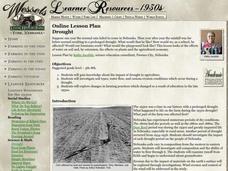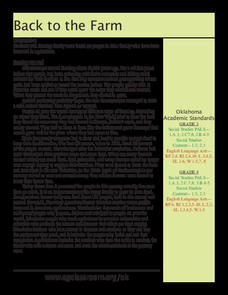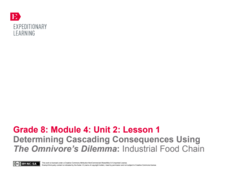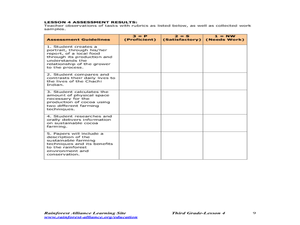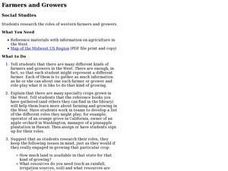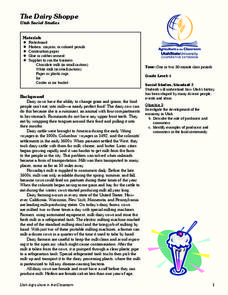Curated OER
Drought
Learners gain knowledge about the impact of drought in agriculture. They investigate soil types, water flow, and various erosion conditions which occur during a drought and see how farming practices changed after the 1930's.
Curated OER
The Fact Finders
Students analyze agricultural data and make predictions about events in history. In this history lesson, students correlate the relationship between historic events and issues in agriculture to see if there is a correlation. They analyze...
Curated OER
THE GREAT DEPRESSION THROUGH PHOTOGRAPHS
Middle schoolers, investigating and analyzing the period known as the Great Depression, view and critique photographs of the agricultural Acadian community in the St. John Valley. They assess the photographs to make conclusions about the...
Curated OER
Better Butter
Students explore the process of making butter. For this agriculture lesson, students discuss how butter is made today and how it was made in the past. Students make their own butter using baby food jars and some "elbow grease."
Curated OER
Kensington Mansion: Plantation, Sharecroppers, Tenants
Eleventh graders investigate the significance of the Kensington Mansion. In this South Carolina history lesson, 11th graders take field trips to the mansion and research primary and secondary sources about plantations, sharecropping, and...
Curated OER
Next Year's Seeds
Students play a game that demonstrates variables that affect farming. They write letters requesting free seed catalogs. They discuss the saying "A penny saved is a penny earned" in relation to what they learned from playing the attached...
Curated OER
Track the Path of Coffee From Farm to Store Shelf
Students investigate the cultivation and marketing of coffee. In this global studies instructional activity, students consider the connections of the 21st century world as they explore how coffee makes it from farms to their homes....
Curated OER
My Farm Web
Third graders explore agriculture by viewing video clips in class. In this farm animal lesson, 3rd graders identify the animals mostly eaten that come from farms and the types of food they consume before they are eaten by us. Students...
Curated OER
Back to the Farm
Read up on farming and ranching and connect this information to your learners' lives. After reading, send class members home to fill out a family tree and trace their family history, focusing on farming and ranching backgrounds. Once...
Curated OER
Building the Terrarium
Students draw a layout of their proposed terrarium. In this social studies lesson, students discuss how Mayans farm to produce food for the family. They compare their farming method with modern farming practices.
Smithsonian Institution
Strength in Solidarity: Coalition of Immokalee Workers and the Campaign for Fair Food
Not all food is created equal. The lesson dives into the world of migrant farm workers to show their struggles to earn livable wages and better working conditions. Academics learn why the Coalition of Immokalee Workers was created and...
EngageNY
Determining Cascading Consequences Using The Omnivore’s Dilemma: Industrial Food Chain
Which of Michael Pollan's four food chains from his book The Omnivore's Dilemma would best feed everyone in the United States? Using a thought-provoking resource, scholars learn how to create a Cascading Consequences chart to answer the...
Curated OER
Equadorian Rainforest: The Tropical Supermarket
Students study the concept of sustainable agricultural practices through cocoa farming and the lives of the people who are the producers. Students watch a slide show and read a story which helps them understand the origins of chocolate,...
Curated OER
Farmers and Growers
Students explore the lives and work of the farmers and growers of specialty crops of the West. The amount of land and natural resources needed, the fertilizers utilized, and the market available for the crops are investigated in this...
Curated OER
Contours, Curves & Lines
Learners discover how straight lines and curves function in both art and the science of conservation tillage by building model "hills" and experimenting on them.
Curated OER
Baa, Ram, Ewe.... Sheep Tales
Pupils explore animal characteristics by reading animal stories in class. In this sheep habitat lesson, students identify the uses for sheep in our agricultural based society and the importance of wool in our economy. Pupils read several...
Curated OER
Earth's Valuable Soil
Students investigate the concept of how the earth is segmented into different parts. They use an apple as a model to display the different layers. The apple is divided into different fractions by being cut into different size pieces.
Curated OER
What Is On Your Plate?
Young scholars investigate the type of foods that are grown in Alaska. The introduction gives the justification, facts, and statistics to be shared with students. They draw and chart the many different types of food that can be eaten in...
Curated OER
Bioterrorism
Students investigate the problem of bioterrorism. The goal of the activity is to prepare them for possible emergencies. The teacher has the freedom to add to the activity in the form of supplemental information as needed. Students can...
Curated OER
Space Age Technology Comes to Earth
Students explore jobs related to agriculture. In this technology/agriculture lesson plan, students recognize the importance of natural resources and agriculture on the use of Range Rambler software. Students complete an experiment...
Curated OER
An Ancient Greek and Roman Festival
Third graders label a map of ancient Greek and Roman civilizations and do a written report on one element of these two cultures. They participate in discussions of food, farming, daily life and government (among others). Students use the...
Curated OER
The Dairy Shoppe
Fifth graders research dairy farming and learn about dairy products as well as dairy processing. In this dairy lesson, 5th graders read background information about dairy farming and processing. Students discuss running a small business...
Curated OER
Why is rice important?
Second graders examine why rice is so important to the world. In this agriculture lesson, 2nd graders discover the origins of rice farming. Students study how many countries depend on rice for survival. Students research countries and...
